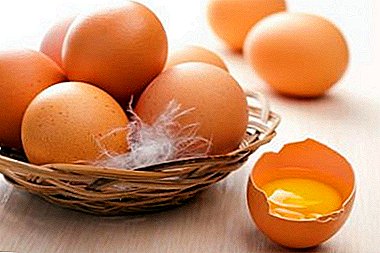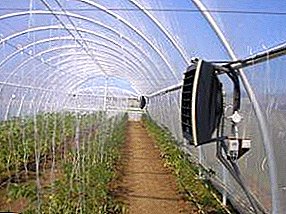
Egg is a very healthy and necessary food. Its composition is rich in vitamin D. Phosphorus, manganese, calcium, potassium, iron, copper, cobalt, sulfur, boron, iodine and many other trace elements are also available.
Amino acids are also enriched. To preserve as much as possible the taste, as well as all these beneficial substances, it is important to store eggs unmistakably.
Regulatory requirements according to GOST or SanPiN
Clause 8.2 of GOST R 52121-2003 "Food Eggs. Technical Conditions" establishes the standards for egg storage. So, the content should be within the temperature range from 0 C to 20 C. Humidity is also important and should be 85-88%. GOST sets how much time can be stored under these conditions - up to 90 days. For a special category of eggs has its own term:
- for diet - no more than 7 days;
- for dining rooms - no more than 25 days;
- for washed - no more than 12 days.
How to keep freshly picked raw at home?
In everyday life, there are usually two ways to store:
- in a refrigerator;
- in room.
 In the refrigerator you need to install 1-2 degrees. This is the best temperature for good storage. Homemade eggs in the refrigerator can be stored for up to three months. Shopping should not be kept longer than one month.
In the refrigerator you need to install 1-2 degrees. This is the best temperature for good storage. Homemade eggs in the refrigerator can be stored for up to three months. Shopping should not be kept longer than one month.
A common mistake of people is laying eggs in special containers installed on the doors of the refrigerator. Such an arrangement for long-term storage is not suitable. Why?
- First, shifting and staggering is harmful for eggs. And this just happens every time the door opens.
- Secondly, the door shelves are constantly changing when opening the temperature and humidity, which also adversely affects them.
IMPORTANT: Eggs must be placed in the lower container. They are usually intended for fruits and vegetables, but they are also suitable for eggs. There the lowest temperature and humidity are kept as stable as possible.
But this does not mean that it is forbidden to place our products on the door. There you can put them on the condition that they will be used in the near future. At room temperature, shelf life is reduced to three weeks.. It is important that the eggs were raw and freshly harvested.
Maximum temperature can be up to 20 degrees. The relative humidity of the air for such storage should be 70-85%. For best storage, eggs can be wrapped in paper. This may be a newspaper, office paper, baking paper, etc. Other housewives are more creative.
Saline is their main friend in this business. Salt has long been recognized as a preservative.. For its preparation need 1 l. water and 1 tbsp. l salt. Eggs are immersed in this solution and sent to a place where light rays do not fall. In this miracle solution can be stored for up to four weeks.
All the above rules apply only to raw eggs. Boiled eggs quickly become worthless. In the refrigerator, a heat-treated egg can be kept for up to 15 days. If the shell is damaged during cooking, then up to 5 days.
How many days can be stored for incubation?
 Farmers with an incubator often face egg storage problems. To achieve savings in the incubator you need to lay the maximum possible number of eggs. But what to do if they can not be collected at once? You have to postpone them until you get the right amount.
Farmers with an incubator often face egg storage problems. To achieve savings in the incubator you need to lay the maximum possible number of eggs. But what to do if they can not be collected at once? You have to postpone them until you get the right amount.
Also, experts have found that the best percentage of hatchlings is obtained if after laying eggs lay for 5-7 days. This is the plan of nature itself. In natural conditions, the female lays eggs for several days and only after that begins to hatch them.
There is their natural cooling. First, it should be noted that the development of the embryo begins even when the egg is inside the bird. After the egg has been laid down, it cools and the development of the embryo stops in parallel with it. This is a completely natural process. It is harmless to the fetus.
If an egg is laid and placed in an incubator separated by a long period of time, then irreversible processes take place in it. The egg grows old and becomes unsuitable for the development of the chick.
What processes are happening?
- The protein loses its layering, the texture becomes more watery. Lysozyme disintegrates, it is responsible for the antibacterial effect. In the yolk, cells, nitrogenous compounds and vitamins break up. Fats decompose. It is important to keep eggs at the right temperature.
If the temperature goes below zero, the eggs freeze, and the future life in it dies. Above 20 degrees, the development of the embryo does not stop, but it does not develop correctly, with pathology and soon also dies.
TIP: For an incubator, the optimal storage temperature is between +8 and + 12 degrees.
- Do not forget about the humidity. If the humidity is low, the eggs lose a lot of mass. In 24 hours, on average 0.2% of weight is lost.
- Another nuance of preparing eggs for the incubation process is the prohibition of placing them in a room where there are drafts. Airflows also affect moisture loss. The air must be fresh, poor ventilation contributes to the accumulation of pathogenic microbes, the formation of mold.
- As a general rule, the testicles need to have a sharp end down. But this rule is more suitable for breeding chickens, guinea fowls, turkeys and small ducks. Goose need to be placed horizontally. At the same time every 5 days they need to twist 90 degrees.
 Large ducks need to be stored in a semi sloping position. Eggs are best kept in plastic trays with round holes so that they do not touch each other. Cardboard trays are bad for storage. Since they are reusable, cardboard over time accumulates moisture, dust, dirt, bacteria, which adversely affects the desired result.
Large ducks need to be stored in a semi sloping position. Eggs are best kept in plastic trays with round holes so that they do not touch each other. Cardboard trays are bad for storage. Since they are reusable, cardboard over time accumulates moisture, dust, dirt, bacteria, which adversely affects the desired result.- If you decide to engage in an incubator, then the place for storing eggs should be equipped with necessary instruments for measuring temperature and humidity (for information on what should be the incubation temperature of chicken eggs, read this material) It is important to note that for incubation it is necessary to carry out a careful selection of eggs. Make sure that they are not cracked or otherwise damaged (the rules for selecting and checking eggs for incubation can be found here, and from this article you will learn about the procedure of ovoscoping).
- They do not need to be washed, as the natural antibacterial shell of the shell will be washed away and, if any damage is caused, pathogenic microbes can get inside.
You can learn more about the mode of incubation of chicken eggs in different periods, as well as see the tables of the optimal temperature, humidity and other factors by day here.
Watch the video about collecting and storing eggs for incubation:
Conditions for increasing chick survival
Experts have found that for incubation, eggs can be stored for a maximum of 5-7 days. You can store longer, but the percentage of hatching chicks will fall proportionately. For clarity, the following table.
| Storage time (days) | Number of surviving embryos (percent) | ||
| chickens | ducks | geese | |
| 5 | 91,5 | 85,6 | 79,7 |
| 10 | 82,4 | 80,0 | 72,6 |
| 15 | 70,2 | 73,4 | 53,6 |
| 20 | 23,4 | 47,1 | 32,5 |
| 25 | 15,0 | 6 | 5,0 |
We talked more about the time of incubation of chicken eggs here, and about the features of artificial breeding of chickens at home, you can read here.
It should be noted that the longer eggs for reproduction are stored, the greater the risk of hatching sick chicks. Eggs have two purposes: to be a useful and tasty food product, and to perform a reproductive function, aimed at the continuation of the species. As in one, and in the second case, it is important to ensure the correct conditions for their storage. Only in this way can we get decent food on the table and healthy chicks.


 Large ducks need to be stored in a semi sloping position. Eggs are best kept in plastic trays with round holes so that they do not touch each other. Cardboard trays are bad for storage. Since they are reusable, cardboard over time accumulates moisture, dust, dirt, bacteria, which adversely affects the desired result.
Large ducks need to be stored in a semi sloping position. Eggs are best kept in plastic trays with round holes so that they do not touch each other. Cardboard trays are bad for storage. Since they are reusable, cardboard over time accumulates moisture, dust, dirt, bacteria, which adversely affects the desired result.









